新视野大学英语2课文翻译
新视野大学英语读写教程2-(第三版)-unit-2-课文原文及翻译
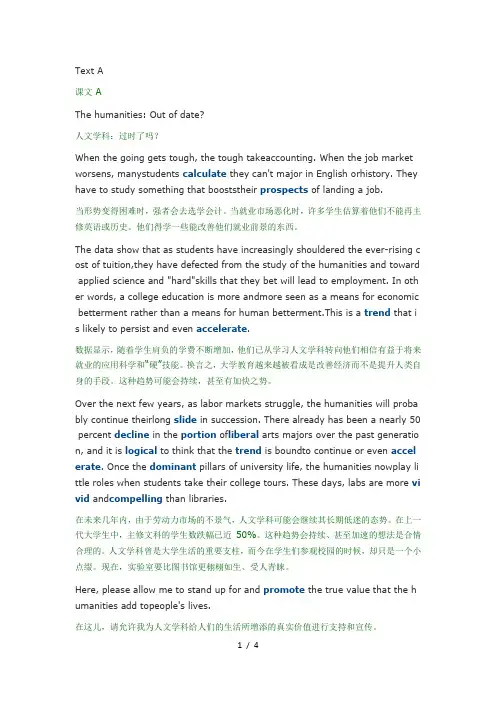
Text A课文 AThe humanities: Out of date?人文学科:过时了吗?When the going gets tough, the tough takeaccounting. When the job market worsens, manystudents calculate they can't major in English orhistory. They have to study something that booststheir prospects of landing a job.当形势变得困难时,强者会去选学会计。
当就业市场恶化时,许多学生估算着他们不能再主修英语或历史。
他们得学一些能改善他们就业前景的东西。
The data show that as students have increasingly shouldered the ever-rising c ost of tuition,they have defected from the study of the humanities and toward applied science and "hard"skills that they bet will lead to employment. In oth er words, a college education is more andmore seen as a means for economic betterment rather than a means for human betterment.This is a trend that i s likely to persist and even accelerate.数据显示,随着学生肩负的学费不断增加,他们已从学习人文学科转向他们相信有益于将来就业的应用科学和“硬”技能。
新视野大学英语(第二版)读写教程第二册课后翻译及原文

新视野大学英语(第二版)读写教程第二册课后翻译及原文-CAL-FENGHAI.-(YICAI)-Company One1Unit 11她连水都不愿喝一口,更别提留下来吃饭了。
1.She wouldn't take a drink, much less would she stay for dinner.2他认为我在对他说谎,但实际上我讲的是实话。
2.He thought I was lying to him,whereas I was telling the truth.3这个星期你每天都迟到,对此你怎么解释?3.How do you account for the fact that you have been late every day this week?4他们利润增长的部分原因是采用了新的市场策略。
4.The increase in their profits is due partly to their new market strategy.5这样的措施很可能会带来工作效率的提高。
5.Such measures are likely to result in the improvement of work efficiency.6我们已经在这个项目上投入了大量的时间和精力,所以我们只能继续。
6.We have already poured a lot of time and energy into the project, so we have to carry on.Unit 21尽管她是家里的独生女,她父母也从不溺爱她。
1.Despite the fact that she is the only child in her family, she is never babied by her parents.2迈克没来参加昨晚的聚会,也没给我打电话做任何解释。
2.Mike didn't come to the party last night, nor did he call me to give an explanation. 3坐在他旁边的那个人确实发表过一些小说,但绝不是什么大作家。
新视野大学英语2读写教程课文翻译
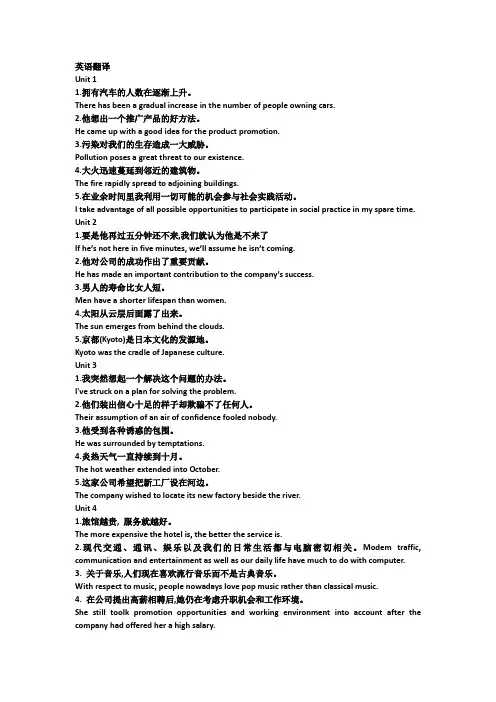
英语翻译Unit 11.拥有汽车的人数在逐渐上升。
There has been a gradual increase in the number of people owning cars.2.他想出一个推广产品的好方法。
He came up with a good idea for the product promotion.3.污染对我们的生存造成一大威胁。
Pollution poses a great threat to our existence.4.大火迅速蔓延到邻近的建筑物。
The fire rapidly spread to adjoining buildings.5.在业余时间里我利用一切可能的机会参与社会实践活动。
I take advantage of all possible opportunities to participate in social practice in my spare time. Unit 21.要是他再过五分钟还不来,我们就认为他是不来了If he’s not here in five minutes, we’ll assume he isn’t coming.2.他对公司的成功作出了重要贡献。
He has made an important contribution to the company’s success.3.男人的寿命比女人短。
Men have a shorter lifespan than women.4.太阳从云层后面露了出来。
The sun emerges from behind the clouds.5.京都(Kyoto)是日本文化的发源地。
Kyoto was the cradle of Japanese culture.Unit 31.我突然想起一个解决这个问题的办法。
I've struck on a plan for solving the problem.2.他们装出信心十足的样子却欺骗不了任何人。
新视野大学英语2第二单元课文翻译
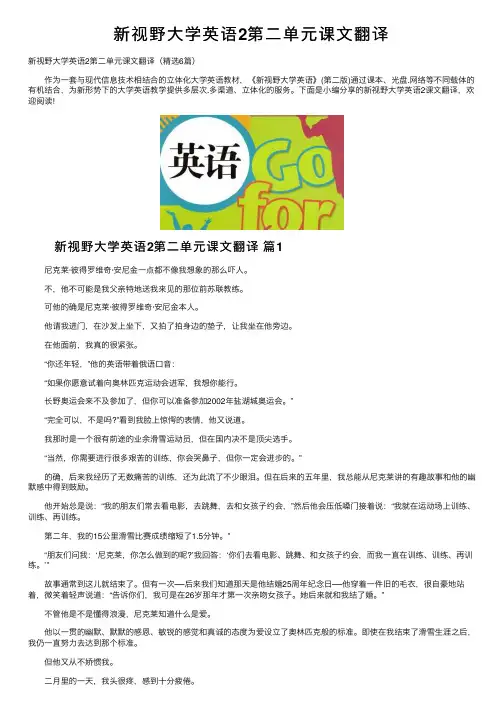
新视野⼤学英语2第⼆单元课⽂翻译新视野⼤学英语2第⼆单元课⽂翻译(精选6篇) 作为⼀套与现代信息技术相结合的⽴体化⼤学英语教材,《新视野⼤学英语》(第⼆版)通过课本、光盘.⽹络等不同载体的有机结合,为新形势下的⼤学英语教学提供多层次.多渠道、⽴体化的服务。
下⾯是⼩编分享的新视野⼤学英语2课⽂翻译,欢迎阅读! 新视野⼤学英语2第⼆单元课⽂翻译篇1 尼克莱·彼得罗维奇·安尼⾦⼀点都不像我想象的那么吓⼈。
不,他不可能是我⽗亲特地送我来见的那位前苏联教练。
可他的确是尼克莱·彼得罗维奇·安尼⾦本⼈。
他请我进门,在沙发上坐下,⼜拍了拍⾝边的垫⼦,让我坐在他旁边。
在他⾯前,我真的很紧张。
“你还年轻,”他的英语带着俄语⼝⾳: “如果你愿意试着向奥林匹克运动会进军,我想你能⾏。
长野奥运会来不及参加了,但你可以准备参加2002年盐湖城奥运会。
” “完全可以,不是吗?”看到我脸上惊愕的表情,他⼜说道。
我那时是⼀个很有前途的业余滑雪运动员,但在国内决不是顶尖选⼿。
“当然,你需要进⾏很多艰苦的训练,你会哭⿐⼦,但你⼀定会进步的。
” 的确,后来我经历了⽆数痛苦的训练,还为此流了不少眼泪。
但在后来的五年⾥,我总能从尼克莱讲的有趣故事和他的幽默感中得到⿎励。
他开始总是说:“我的朋友们常去看电影,去跳舞,去和⼥孩⼦约会,”然后他会压低嗓门接着说:“我就在运动场上训练、训练、再训练。
第⼆年,我的15公⾥滑雪⽐赛成绩缩短了1.5分钟。
” “朋友们问我:‘尼克莱,你怎么做到的呢?’我回答:‘你们去看电影、跳舞、和⼥孩⼦约会,⽽我⼀直在训练、训练、再训练。
’” 故事通常到这⼉就结束了。
但有⼀次──后来我们知道那天是他结婚25周年纪念⽇──他穿着⼀件旧的⽑⾐,很⾃豪地站着,微笑着轻声说道:“告诉你们,我可是在26岁那年才第⼀次亲吻⼥孩⼦。
她后来就和我结了婚。
” 不管他是不是懂得浪漫,尼克莱知道什么是爱。
新视野大学英语读写教程(第二版)第二册课文及翻译
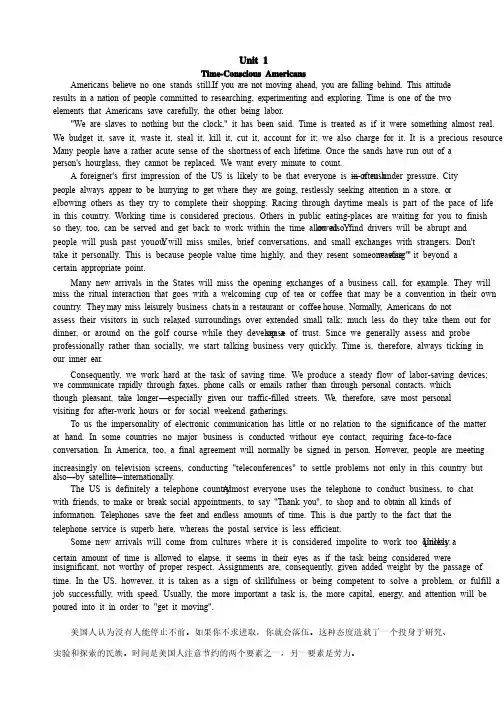
Unit 1Time-Conscious AmericansAmericans Americans believe believe believe no no no one stands still. one stands still. I f If If you you you are are are not not not moving moving moving ahead, ahead, ahead, you you you are are are falling falling falling behind. behind. behind. This This This attitude attitude results results in in in a a a nation nation nation of of of people people people committed committed committed to to to researching, researching, researching, experimenting experimenting experimenting and and and exploring. exploring. exploring. Time Time Time is is is one one one of of of the the the two two elements that Americans save carefully, the other being labor. "We are slaves to nothing but the clock," it has been said. Time is treated as if it were something almost real. We budget it, save it, waste it, steal it, kill it, cut it, account for it; we also charge for it. It is a precious resource Many Many people people people have have have a a a rather rather rather acute acute acute sense sense sense of of of the shortness the shortness of of each each each lifetime. lifetime. lifetime. Once Once Once the the the sands sands sands have have have run run run out out out of of of a a person's hourglass, they cannot be replaced. We want every minute to count. A foreigner's first impression of the US is likely to be that everyone is in a rush —often under pressure. City people people always always always appear appear appear to to to be be be hurrying hurrying hurrying to to to get get get where where where they they they are are are going, going, going, restlessly restlessly restlessly seeking seeking seeking attention attention attention in in in a a a store, store, store, or or elbowing others as they try to complete their shopping. Racing through daytime meals is part of the pace of life in this country. Working time is considered precious. Others in public eating-places are waiting for you to finish so they, too, can be served and get back to work within the time allowed. Y ou also find drivers will be abrupt and people will push past you. Y ou will miss smiles, brief conversations, and small exchanges with strangers. Don't take it personally. This is because people value time highly, and they resent someone else "wasting" it beyond a certain appropriate point. Many new arrivals in the States will miss the opening exchanges of a business call, for example. They will miss the ritual interaction that goes with a welcoming cup of tea or coffee that may be a convention in their own country . They may may miss miss miss leisurely leisurely leisurely business chats business chats in in a a a restaurant restaurant restaurant or coffee or coffee house. house. Normally, Normally, Normally, Americans Americans Americans do do do not not assess their visitors in such relaxed surroundings over extended small talk; much less do they take them out for dinner, or around on the golf course while they develop a sense of trust. Since we generally assess and probe professionally rather than socially, we start talking business very quickly. Time is, therefore, always ticking in our inner ear. Consequently, we work hard at the task of saving time. We produce a steady flow of labor-saving devices; we we communicate communicate communicate rapidly rapidly rapidly through through through faxes, faxes, faxes, phone phone phone calls calls calls or or or emails emails emails rather rather rather than than than through through through personal personal personal contacts, contacts, contacts, which which though though pleasant, pleasant, pleasant, take take take longer longer longer——especially especially given given given our our our traffic-filled traffic-filled streets. streets. W W e, therefore, therefore, save save save most most most personal personal visiting for after-work hours or for social weekend gatherings. To us the impersonality of electronic communication has little or no relation to the significance of the matter at hand. hand. In In In some some some countries countries no major business is conducted conducted without without eye contact, contact, requiring requiring face-to-face conversation. In America, too, a final agreement will normally be signed in person. However, people are meeting increasingly on television screens, conducting "teleconferences" to settle problems not only in this country but also also——by satellite—internationally. The US is definitely a telephone country . Almost everyone uses the telephone to conduct business, to chat with with friends, friends, friends, to to to make make make or or or break break break social social social appointments, appointments, appointments, to to to say say say "Thank "Thank "Thank you", you", you", to to to shop shop shop and and and to to to obtain obtain obtain all all all kinds kinds kinds of of information. information. Telephones Telephones Telephones save save save the the the feet feet feet and and and endless endless endless amounts amounts amounts of of of time. time. time. This This This is is is due due due partly partly partly to to to the the the fact fact fact that that that the the telephone service is superb here, whereas the postal service is less efficient. Some new arrivals will come from cultures where it is considered impolite to work too quickly. Unless a certain certain amount amount amount of of of time time time is is is allowed allowed allowed to to to elapse, elapse, elapse, it it it seems seems seems in in in their their their eyes eyes eyes as as as if if if the the the task task task being being being considered considered considered were were insignificant, not worthy of proper respect. Assignments are, consequently, given added weight by the passage of time. In the US, however, it is taken as a sign of skillfulness or being competent to solve a problem, or fulfill a job successfully, with speed. Usually, the more important a task is, the more capital, energy, and attention will be poured into it in order to "get it moving". 美国人认为没有人能停止不前。
新视野大学英语第三版第二册U2课文原文+翻译
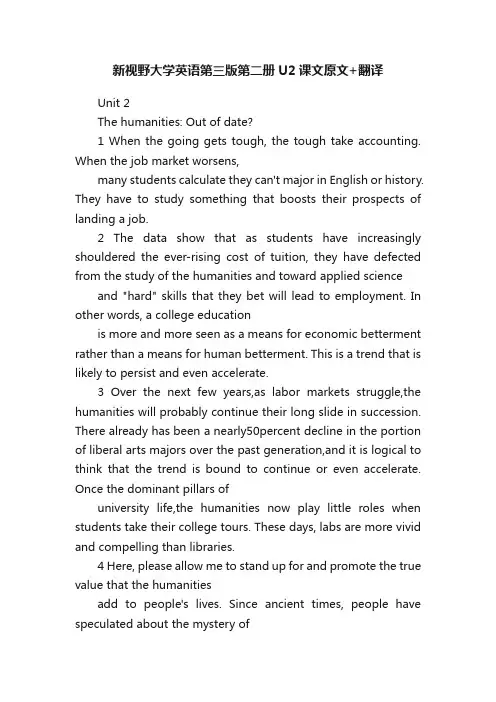
新视野大学英语第三版第二册U2课文原文+翻译Unit 2The humanities: Out of date?1 When the going gets tough, the tough take accounting. When the job market worsens,many students calculate they can't major in English or history. They have to study something that boosts their prospects of landing a job.2 The data show that as students have increasingly shouldered the ever-rising cost of tuition, they have defected from the study of the humanities and toward applied science and "hard" skills that they bet will lead to employment. In other words, a college educationis more and more seen as a means for economic betterment rather than a means for human betterment. This is a trend that is likely to persist and even accelerate.3 Over the next few years,as labor markets struggle,the humanities will probably continue their long slide in succession. There already has been a nearly50percent decline in the portion of liberal arts majors over the past generation,and it is logical to think that the trend is bound to continue or even accelerate. Once the dominant pillars ofuniversity life,the humanities now play little roles when students take their college tours. These days, labs are more vivid and compelling than libraries.4 Here, please allow me to stand up for and promote the true value that the humanitiesadd to people's lives. Since ancient times, people have speculated about the mystery ofthose inner forces that drive some people to greatness and others to self-destruction. Thisinner drive has been called many things over the centuries. The famous psychologist, Sigmund Freud,called it the"unconscious mind"or,more familiarly, "instinct".5 From the beginning of time,this inner aspect of our being,this drive that can be constructive or destructive,has captured our imagination. The stories of this amazing struggle have formed the basis of cultures the world over. Historians, architects, authors, philosophers and artists have captured the words,images and meanings of this inner struggle in the form of story, music, myth, painting, architecture, sculpture, landscape and traditions. These men and women developed artistic "languages" that help us understandthese aspirations and also educate generations. This fertile body of w ork from ancient times, the very foundation of civilization, forms the basis of study of the humanities.6 Studying the humanities improves our ability to read and write. No matter what we do inlife, we will have a huge advantage if we can read complex ideas and understand theirmeaning. We will have a bright career if we are the person in the office who can write aclear and elegant analysis of those ideas!7 Studying the humanities makes us familiar with the language of emotion and the creative process. In an information economy, many people have the ability to produce a useful product such as a new MP3 player. Yet, very few people have the ability to create a spectacular brand:the iPod. Most importantly,studying the humanities invests us with greatinsight and self-awareness, there by releasing our creative energy and talent in a positive and constructive manner.8 Perhaps the best argument in favor of the humanities is the scope of possibilities thatare widely open to us. Did you know that James Cameron, world-famous director of themovie, Titanic ,graduated with a degree in the humanities? So did Sally Ride,the first woman in space. So did actors Bruce Lee, Gwyneth Paltrow, Renee Zellweger and MattDamon. Dr. Harold Varmus,who won a Nobel Prize for Medicine,studied the humanities. Even Michael Eisner,Chairman of the Disney Company, majored in the humanities. Famous people who studied the humanities make a long list indeed. It's easyto see that the humanities can prepare us for many different careers and jobs we can undertake,whether medicine,business,science or entertainment. If we study only mathematics,it's likely we will be a candidate only for jobs as a mathematician. If we include studying the humanities, we can make breakthroughs on many barriers and are limited only by our effort and imagination.9 Of course,nowadays,if we study the humanities alone,we are liable to miss many opportunities. Each one of us needs to become as technically and professionally skilledas possible to help meet the needs of modern life. In fact,increasingly a pairing of technical knowledge and inner insight is seen as the ideal in the establishment of a career. If I were the Dean of Admissions at a medical school and two people applied to our school, both having the required basic scientific courses, one a philosophy major and theother solely a pre-med student, the philosophy applicant would be chosen.10 In summary, the humanities help to create well-rounded human beings with insight and understanding of the passions,hopes and dreams common to all humanity. The humanities, the ancient timeless reservoir of knowledge, teach us to see things differentlyand broaden our horizons. They are as useful and relevant in our modern age as they have always been. Doesn't it make sense to spend some time in the company of the humanities,our outstanding and remarkable treasure of knowledge? Who knows how famous YOU might become!Translation人文学科:过时了吗?1 当形势变得困难时,强者会去选学会计。
新视野大学英语2全部课文原文中英文翻译
新视野大学英语2全部课文中英文翻译Unit1Americans believe no one stands still. If you are not moving ahead, you are falling behind. This attitude results in a nation of people committed to researching, experimenting and exploring. Time is one of the two elements that Americans save carefully, the other being labor.美国人相信没有人会停滞不前。
如果你不前进,你就落后了。
这种态度造就了一个致力于研究、试验和探索的民族。
时间是美国人谨慎节约的两个要素之一,另一个是劳动。
"We are slaves to nothing but the clock,” it has been said. Time is treated as if it were something almost real. We budget it, save it, waste it, steal it, kill it, cut it, account for it; we also charge for it. It is a precious resource. Many people have a rather acute sense of the shortness of each lifetime. Once the sandshave run out of a person’s hourglass, they cannot be replaced. We want every minute to count.有人说:“我们只是时钟的奴隶。
新视野大学英语2 第三版Unit2-3 课文翻译
人文学科:过时了吗?当形势变得困难时,强者会去选学会计。
当就业市场恶化时,许多学生估算着他们不能再主修英语或历史。
他们得学一些能改善他们就业前景的东西。
数据显示,随着学生肩负的学费不断增加,他们已从学习人文学科转向他们相信有益于将来就业的应用科学和“硬”技能。
换言之,大学教育越来越被看成是改善经济而不是替身人类自身的手段。
这种趋势可能会持续,甚至有加快之势。
在未来几年内,由于劳动市场的不景气,人文学科可能会继续其长期低迷的态势。
在上一代大学生中,主修人文学科的学生数跌幅已近50%。
这种趋势会持续、甚至加速的想法是合情合理的。
人文学科曾是大学生活的重要支柱,而今在学生们参观校园的时候,却只是一个小点缀。
现在,实验室要比图书馆更栩栩如生、受人青睐。
在这儿,请允许我为人文学科给人们的生活所增添的真实价值进行支持和宣传。
自古以来,人们一直在思索人类自身具有什么神奇的内力使一些人变得崇高伟大,而使另一些人走向自我毁灭。
几个世纪以来,这股内力被称作很多东西。
著名的心理学家西格蒙德弗洛伊德称之为“潜意识”,或更为人熟知的“本能”。
从一开始,人类这股可以是建设性也可以是毁灭性的内在驱动力,就令我们心驰神往。
这些惊人的、充满内心挣扎的故事形成了世界文化的基础。
历史学家、建筑师、作家、哲学家和艺术家们以故事、音乐、神话、绘画、建筑、雕刻、风景画和传统的形式,捕捉到了这些撞击心灵的文字、形象及内涵。
这些男男女女创造出了具有艺术性的“语言”,帮助我们了解人类的这些强烈愿望,并用以教育一代又一代人。
从古时起开始的这些充满想象的大量作品,正是文明的底蕴,它奠定了人文研究的基础。
学习人文学科会提高我们的阅读和写作能力。
无论我们这一生中从事什么职业,如果我们能读懂复杂的思想并理解它们的内涵,我们都会受益匪浅。
如果我们是在办公室能对这些思想做出写出既明确又简洁的分析的人,我们会有光明的职业前景。
学习人文学科会让我们熟悉表达情感的语言及进行创造的过程。
新视野大学英语读写教程2-(第三版)-unit-2-课文原文及翻译
新视野大学英语读写教程2-(第三版)-u n i t-2-课文原文及翻译-CAL-FENGHAI.-(YICAI)-Company One1Text A课文 AThe humanities: Out of date?人文学科:过时了吗?When the going gets tough, the tough takeaccounting. When the job market worsens, manystud ents calculate they can't major in English orhistory. They have to study something that booststhe ir prospects of landing a job.当形势变得困难时,强者会去选学会计。
当就业市场恶化时,许多学生估算着他们不能再主修英语或历史。
他们得学一些能改善他们就业前景的东西。
The data show that as students have increasingly shouldered the ever-rising cost of tuition,they have defected from the study of the humanities and toward applied sci ence and "hard"skills that they bet will lead to employment. In other words, a college education i s more andmore seen as a means for economic betterment rather than a means for human bette rment.This is a trend that is likely to persist and even accelerate.数据显示,随着学生肩负的学费不断增加,他们已从学习人文学科转向他们相信有益于将来就业的应用科学和“硬”技能。
新视野大学英语第三版第二册U2课文原文+翻译
Unit 2The humanities: Out of date?1 When the going gets tough, the tough take accounting. When the job market worsens, many students calculate they can't major in English or history. They have to study something that boosts their prospects of landing a job.2 The data show that as students have increasingly shouldered the ever-rising cost of tuition, they have defected from the study of the humanities and toward applied science and "hard" skills that they bet will lead to employment. In other words, a college education is more and more seen as a means for economic betterment rather than a means for human betterment. This is a trend that is likely to persist and even accelerate.3 Over the next few years, as labor markets struggle, the humanities will probably continue their long slide in succession. There already has been a nearly 50 percent decline in the portion of liberal arts majors over the past generation, and it is logical to think that the trend is bound to continue or even accelerate. Once the dominant pillars of university life, the humanities now play little roles when students take their college tours. These days, labs are more vivid and compelling than libraries.4 Here, please allow me to stand up for and promote the true value that the humanities add to people's lives. Since ancient times, people have speculated about the mystery of those inner forces that drive some people to greatness and others to self-destruction. This inner drive has been called many things over the centuries. The famous psychologist, Sigmund Freud, called it the "unconscious mind" or, more familiarly, "instinct".5 From the beginning of time, this inner aspect of our being, this drive that can be constructive or destructive, has captured our imagination. The stories of this amazing struggle have formed the basis of cultures the world over. Historians, architects, authors, philosophers and artists have captured the words, images and meanings of this inner struggle in the form of story, music, myth, painting, architecture, sculpture, landscape and traditions. These men and women developed artistic "languages" that help us understand these aspirations and also educate generations. This fertile body of work from ancient times, the very foundation of civilization, forms the basis of study of the humanities.6 Studying the humanities improves our ability to read and write. No matter what we do in life, we will have a huge advantage if we can read complex ideas and understand their meaning. We will have a bright career if we are the person in the office who can write a clear and elegant analysis of those ideas!7 Studying the humanities makes us familiar with the language of emotion and the creative process. In an information economy, many people have the ability to produce a useful product such as a new MP3 player. Yet, very few people have the ability to create a spectacular brand: the iPod. Most importantly, studying the humanities invests us with great insight and self-awareness, there by releasing our creative energy and talent in a positive and constructive manner.8 Perhaps the best argument in favor of the humanities is the scope of possibilities that are widely open to us. Did you know that James Cameron, world-famous director of the movie, Titanic, graduated with a degree in the humanities? So did Sally Ride, the first woman in space. So did actors Bruce Lee, Gwyneth Paltrow, Renee Zellweger and Matt Damon. Dr. Harold Varmus, who won a Nobel Prize for Medicine, studied the humanities. Even Michael Eisner, Chairman of the Disney Company, majored in the humanities. Famous people who studied the humanities make a long list indeed. It's easy to see that the humanities can prepare us for many different careers and jobs we can undertake, whether medicine, business, science or entertainment. If we study only mathematics, it's likely we will be a candidate only for jobs as a mathematician. If we include studying the humanities, we can make breakthroughs on many barriers and are limited only by our effort and imagination.9 Of course, nowadays, if we study the humanities alone, we are liable to miss many opportunities. Each one of us needs to become as technically and professionally skilled as possible to help meet the needs of modern life. In fact, increasingly a pairing of technical knowledge and inner insight is seen as the ideal in the establishment of a career. If I were the Dean of Admissions at a medical school and two people applied to our school, both having the required basic scientific courses, one a philosophy major and the other solely a pre-med student, the philosophy applicant would be chosen.10 In summary, the humanities help to create well-rounded human beings with insight and understanding of the passions, hopes and dreams common to all humanity. The humanities, the ancient timeless reservoir of knowledge, teach us to see things differently and broaden our horizons. They are as useful and relevant in our modern age as they have always been. Doesn't it make sense to spend some time in the company of the humanities, our outstanding and remarkable treasure of knowledge? Who knows how famous YOU might become!Translation人文学科:过时了吗?1 当形势变得困难时,强者会去选学会计。
- 1、下载文档前请自行甄别文档内容的完整性,平台不提供额外的编辑、内容补充、找答案等附加服务。
- 2、"仅部分预览"的文档,不可在线预览部分如存在完整性等问题,可反馈申请退款(可完整预览的文档不适用该条件!)。
- 3、如文档侵犯您的权益,请联系客服反馈,我们会尽快为您处理(人工客服工作时间:9:00-18:30)。
新视野大学英语2课文翻译(Unit1-Unit7)Unit 1 Section A 时间观念强的美国人Para. 1 美国人认为没有人能停止不前。
如果你不求进取,你就会落伍。
这种态度造就了一个投身于研究、实验和探索的民族。
时间是美国人注意节约的两个要素之一,另一个是劳力。
Para. 2 人们一直说:“只有时间才能支配我们。
”人们似乎是把时间当作一个差不多是实实在在的东西来对待的。
我们安排时间、节约时间、浪费时间、挤抢时间、消磨时间、缩减时间、对时间的利用作出解释;我们还要因付出时间而收取费用。
时间是一种宝贵的资源,许多人都深感人生的短暂。
时光一去不复返。
我们应当让每一分钟都过得有意义。
Para. 3 外国人对美国的第一印象很可能是:每个人都匆匆忙忙——常常处于压力之下。
城里人看上去总是在匆匆地赶往他们要去的地方,在商店里他们焦躁不安地指望店员能马上来为他们服务,或者为了赶快买完东西,用肘来推搡他人。
白天吃饭时人们也都匆匆忙忙,这部分地反映出这个国家的生活节奏。
工作时间被认为是宝贵的。
Para. 3b 在公共用餐场所,人们都等着别人吃完后用餐,以便按时赶回去工作。
你还会发现司机开车很鲁莽,人们推搡着在你身边过去。
你会怀念微笑、简短的交谈以及与陌生人的随意闲聊。
不要觉得这是针对你个人的,这是因为人们非常珍惜时间,而且也不喜欢他人“浪费”时间到不恰当的地步。
Para. 4 许多刚到美国的人会怀念诸如商务拜访等场合开始时的寒暄。
他们也会怀念那种一边喝茶或咖啡一边进行的礼节性交流,这也许是他们自己国家的一种习俗。
他们也许还会怀念在饭店或咖啡馆里谈生意时的那种轻松悠闲的交谈。
一般说来,美国人是不会在如此轻松的环境里通过长时间的闲聊来评价他们的客人的,更不用说会在增进相互间信任的过程中带他们出去吃饭,或带他们去打高尔夫球。
既然我们通常是通过工作而不是社交来评估和了解他人,我们就开门见山地谈正事。
因此,时间老是在我们心中的耳朵里滴滴答答地响着。
Para. 5 因此,我们千方百计地节约时间。
我们发明了一系列节省劳力的装置;我们通过发传真、打电话或发电子邮件与他人迅速地进行交流,而不是通过直接接触。
虽然面对面接触令人愉快,但却要花更多的时间, 尤其是在马路上交通拥挤的时候。
因此,我们把大多数个人拜访安排在下班以后的时间里或周末的社交聚会上。
Para. 6 就我们而言,电子交流的缺乏人情味与我们手头上事情的重要性之间很少有或完全没有关系。
在有些国家, 如果没有目光接触,就做不成大生意,这需要面对面的交谈。
在美国,最后协议通常也需要本人签字。
然而现在人们越来越多地在电视屏幕上见面,开远程会议不仅能解决本国的问题,而且还能通过卫星解决国际问题。
Para. 7 美国无疑是一个电话王国。
几乎每个人都在用电话做生意、与朋友聊天、安排或取消社交约会、表达谢意、购物和获得各种信息。
电话不但能免去走路之劳,而且还能节约大量时间。
其部分原因在于这样一个事实:美国的电话服务是一流的,而邮政服务的效率则差一些。
Para. 8 有些初来美国的人来自其他文化背景不同的国家,在他们的国家,人们认为工作太快是一种失礼。
在他们看来,如果不花一定时间来处理某件事的话,那么这件事就好像是无足轻重的,不值得给予适当的重视。
因此, 人们觉得用的时间长会增加所做事情的重要性。
但在美国,能迅速而又成功地解决问题或完成工作则被视为是有水平、有能力的标志。
通常,工作越重要,投入的资金、精力和注意力就越多,其目的是“使工作开展起来” 。
Unite 1 section B 文化冲击Para. 1 你认为在异国留学是一件听上去非常令人兴奋的事情吗? 会像许多离家去另一个国家学习的年轻人一样感觉很有趣吗? 这当然是一种崭新的经历,它会给你带来机会,让你发现许多迷人的东西,获得一种自由感。
然而,尽管有这些好处,你也会遇到挑战。
因为你第1/14页的观点可能会与存在于不同国家的不同信念、准则、价值观念和传统发生冲突。
你也许会感到很难去适应一种新的文化以及该文化中你不熟悉的那些部分。
这就是“文化冲击” 。
人们经历文化冲击的过程至少包括四个主要阶段。
Para. 2 第一阶段叫做“蜜月期” 。
在这一阶段,你会感觉到生活在一个不同国度里很兴奋,而且每一样东西看上去都妙不可言。
你什么都喜欢,而且好像每个人都对你很好。
另外,新的文化中的生活乐趣好像是无穷无尽的。
Para. 3 然而,文化冲击的第二阶段终究会出现,这就是“敌对期” 。
你开始注意到并不是每样东西都像你原先认为的那样好。
你会对新的文化里的许多东西感到厌倦。
此外,人们也不再把你当作一个客人来对待了。
所有最初看上去非常美好的东西现在变得让人讨厌了,而且每一样东西都使你感到苦恼和厌倦。
Para. 4 通常,在你适应一种新文化的这一阶段中,你会想出一些防卫性的办法来帮助你应付难关,保护自己免受文化冲击的影响。
其中一种办法叫做“压抑法” 。
当你假装所有的东西都可以接受,没有什么东西令你感到烦恼的时候,你就是在运用压抑法。
另一种防卫性办法称做“倒退法” 。
当你的行为举止开始显得比你实际年龄要小的时候,你就是在运用这种办法。
这时,你的行为举止像一个小孩。
你把什么都忘掉了,而且有时你会变得粗心大意,不负责任。
第三种防卫性办法叫做“孤立法” 。
你宁可一个人呆在家里,不想和任何人交流。
你想把自己封闭起来以避免文化冲击的影响,至少你是这样认为的。
孤立法也许是人们用来对付文化冲击的最糟糕的办法之一,因为你把那些能真正帮助你的东西和你隔离开来了。
最后一种防卫性办法叫做“排斥法” 。
这一办法让你觉得自己不需要任何人帮助。
你觉得你可以独自把事情处理好,所以你就不想求助于人。
Para. 5 你在敌意阶段使用的这些办法并不能解决问题。
如果你仅仅是偶尔运用一下其中一个应付办法来帮助你生存下去,这也无妨。
但是你必须谨慎。
这些办法可能会真的使你受到伤害,因为它们会阻碍你对新的文化作出必要的调整。
Para. 6 在克服了自己的敌对情绪后,你就会开始认识到文化冲击的短暂性。
然后你就会步入被称为“恢复期”的第三阶段。
在这个阶段,你会开始变得积极起来,而且你会努力去理解所有你不理解的东西。
整个形势开始变得对你有利了,你会从前面两个阶段出现的症状中恢复过来。
而且你开始使自己适应新的准则、新的价值观念,乃至这个新的国家的各种信念和传统。
你开始明白,虽然这种新的文化的特点和你自己国家的文化特点有所不同,但其中也必定有值得你学习和欣赏的东西。
Para. 7 文化冲击的最后一个阶段被称为“适应期” 。
在这个阶段,你真正达到了感觉良好的境界,因为你已经学到了很多东西, 已经能理解这种新的文化了。
最初使你感到不舒服或陌生的东西,现在已成了你能理解的东西。
这种理解会减轻你的许多压力。
现在你感到自在了,你已经适应了新的文化。
Para. 8 文化冲击是生活在异国他乡的人无法避免的东西。
当你在经历文化冲击的这四个阶段时,它似乎并不是一件有益的事。
然而,当你完全适应了某一种新的文化时,你会更加充分地喜爱这种文化的。
你学会了如何和他人交流,而且你还了解了大量与自己不同文化背景的人们的生活情况。
此外,了解其他各种文化,以及懂得当你身处其中时如何去适应所受到的冲击,可以帮助你更好地了解自己。
Unit2学习奥林匹克标准的爱Para. 1 尼克莱•彼得罗维奇•安尼金一点都不像我想象的那么吓人。
不,他不可能是我父亲特地送我来见的那位前苏联教练。
Para. 2 可他的确是尼克莱•彼得罗维奇•安尼金本人。
他请我进门,在沙发上坐了下来,又第2/14页拍了拍身边的垫子,让我坐在他旁边。
在他面前,我真的很紧张。
Para. 3 “你还年轻,” 他的英语带着俄语口音:“如果你愿意试着向奥林匹克运动会进军,我想你能行。
长野奥运会来不及参加了,但你可以准备参加2002年盐湖城奥运会。
”Para. 4 “完全可以,不是吗?” 看到我脸上惊愕的表情,他又说道。
我那时是一个很有前途的业余滑雪运动员,但在国内决不是顶尖选手。
“当然,你需要进行很多艰苦的训练,你会哭鼻子,但你一定会进步的。
”Para. 5 的确,后来我经历了无数痛苦的训练,还为此流了不少眼泪。
但在后来的五年里,我总能从尼克莱讲的有趣故事和他的幽默感中得到鼓励。
Para. 6 他开始总是说:“我的朋友们常去看电影,去跳舞,去和女孩子约会,” 然后他会降低声音接着说:“我就在运动场上训练、训练、再训练。
第二年,我的15公里滑雪比赛成绩缩短了1.5分钟。
”Para. 7 “朋友们问我:‘尼克莱,你怎么做到的呢?’我回答:‘你们去看电影、跳舞、和女孩子约会,而我一直在训练、训练、再训练。
’ ”Para. 8 故事通常到这儿就结束了。
但有一次——后来我们知道那天是他结婚25周年纪念日——他穿着一件旧的毛衣,很自豪地站着,微笑着轻声说道:“告诉你们,我可是在26岁那年才第一次亲吻女孩子。
她后来就和我结了婚。
”Para. 9 不管他是不是懂得浪漫,尼克莱知道什么是爱。
他以一贯的幽默、默默的感恩、敏锐的感觉和真诚的态度为爱设立了奥林匹克般的标准。
即使在我结束了滑雪生涯之后,我仍一直努力去达到这个标准。
Para. 10 但他又从不娇惯我。
二月里的一天,我头很疼,感到十分疲倦。
我在一片空地上遇见了了他,大概在寒风中的雪地里滑了十五分钟后,我赶上了他,有点小题大做地说:“嘿,尼克莱,我感觉我要死了。
”Para. 11 “如果活到一百岁,人人都会死的,” 他对我的痛苦无动于衷,态度坚决地接着说:“但你现在必须滑、滑、再滑。
”Para. 12 在滑雪板上,我照他说的去做。
但在其他事情上我会反抗他。
在一次经费并不宽裕的滑雪露营活动中,他让我们十个人挤在一个单身汉住的芬兰式屋子里。
第一天我们醒来时发现尼克莱正在做早餐。
然后我们坐在临时拼凑起来的椅子上,围着张小小的牌桌,用勺子很快地吃完早饭。
吃完后,尼克莱把摞起来的油腻腻的碗向我和我唯一的另一个女队友前一推,专断地说:“女孩子们,现在去洗碗吧!”Para. 13 我把餐巾往地上一扔,向他骂道:“让该死的男孩子们去洗吧! 这不公平!” 他没再让我去洗碗,也没对我的大发脾气显得太在意。
他只在滑雪时才显露出强烈的情感。
Para. 14 训练的时候,他会跟着我们迈步的节奏大声发出指令:“对,就这样,一二三,一二三。
” 我祖父的一个好朋友——一位上了年纪的女士——看了尼克莱带我训练的录像带后问道:“他也教舞蹈吗?”Para. 15 在训练时,我一刻不停地纠正着尼克莱指出的错误。
每完成一个动作,我都会问他自己是否有了进步。
Para. 16 “是的,还行。
但如果膝盖能屈得更快些就更好了。
”Para. 17 “可我滑得够快了吗?” 我坚持问他。
